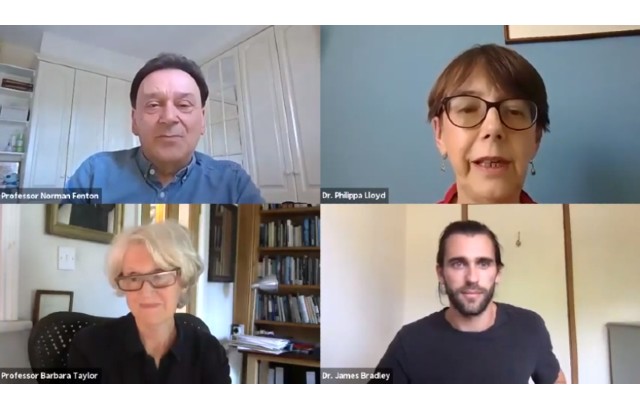Digital Public Lecture Series: People and pandemics – a better world?
In the latest Digital Public Lecture Series experts from Queen Mary discussed their thoughts and experiences relating to Covid-19 and what the world might look like, and what we might want it to look like, post pandemic.

Queen Mary experts discuss Covid-19. Credit: Queen Mary
The third episode of the newly launched series is titled ‘People and Pandemics – A Better World?’ and is chaired by Dr Philippa Lloyd with Professor Barbara Taylor, Professor Norman Fenton and Dr James Bradley. The series is available to watch online.
Covid-19 risk exaggerated
Norman Fenton, Professor of Risk and Information Management in the School of Electonic Engineering and Computer Science, spoke during the debate about his research looking into the causal explanations for covid data as well as uncertainty about its accuracy and biases. In particular he finds that while infection rates are higher than most people believe, the disease is not as deadly as assumed.
He said: “Don’t believe the headline figures about covid risk or risk factors. The message is actually positive, I think the risk has been exaggerated. When taking into account the multiple factors I've identified it's not clear the overall fatality rate is worse than some relatively recent flu epidemics like 1998/99 and that’s before we consider how many cancer deaths, suicides etc will actually result from the unprecedented lockdown and economic damage.”
The politics of loneliness
Barbara Taylor, Professor of Humanities in the School of History, highlighted how a lack of care from government makes solitude a terrifying prospect and that Covid-19 reveals how vital social institutions have been demolished.
She said: “So in this current health crisis what do we do left to the mercies of uncaring government? Across Britain people have turned to each other in a huge upwelling of mutual aid and volunteer action. Kindness to strangers in every way. This has been wonderful to witness but it's not enough, democratic regimes have an obligation to care for the people they claim to represent.
“Our collective loneliness will only be relieved when this care is forthcoming and those who have not provided it are held to account, not later but now before we are engulfed by a second wave of sickness and death in this unfolding tragedy of careless governance.”
The environmental impact of Covid-19
Dr James Bradley, Lecturer in Environmental Science in the School of Geography, focused on the environmental impact of Covid-19 and whether this experience may lead to a greater awareness and understanding of climate change.
He argues that while it looks like we will see about a four per cent decrease in global co2 emissions this year, this shows that global lockdown is not a sufficient means to halt dangerous climate change.
He said: “The pandemic has shown us the climate crisis has never been treated as a crisis really, so as soon as we have a health crisis we can see that most world leaders are able to act swiftly and decisively in response to that... And that same urgency has been completely missing through the climate crisis so that’s become really apparent through this.”
More information:
- To find out about future events and to watch any in the series head to the Public Lecture Series website
Related items

4 August 2025

30 July 2025

28 July 2025